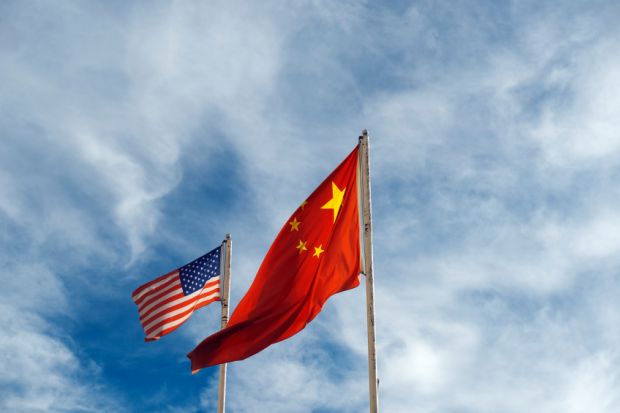A Joe Biden presidency may help to reverse the “highly defensive” diplomatic posture towards China that has risked the long-term standing of American higher education, a leading scholar of the country has said.
But the geopolitical “tensions” that had driven this position would remain and it would be important for US universities to continue to “deepen” their cooperation with Chinese institutions of their own accord, said William Kirby, professor of China studies at Harvard University.
Professor Kirby, speaking at the launch of a new book he has co-edited on academic collaboration along the “New Silk Road”, held before the final result of the election was confirmed, said he had “admired” how US universities had insisted on pursuing internationalisation in the past four years despite the problems brought by the Trump administration.
The role of US universities in the relationship with China has come in for particular scrutiny by the White House, with questions raised about the role of Chinese researchers in academic collaborations, the motivations of Chinese students studying in the US and endowment investments in China-based companies.
However, Professor Kirby told a webinar to launch China and Europe on the New Silk Road: Connecting Universities across Eurasia that he was proud of what Harvard and other institutions had done to “not cower in the face of heavy political winds in this country but to pursue a broadly internationalist agenda”.
“A purely nationalist agenda for a modern university is, in the long term, a death sentence,” he said.
“US universities have become among the very best in the world because they seek the best talent from every part of the world including, and especially in recent years, from China.
“Anything that diminishes that flow of talent and that interchange…will lead to a parochialisation of American higher education that will in time have the threat of making us second rate.”
Professor Kirby believed that when Joe Biden becomes president next year his administration “would reverse much of what you have seen towards this highly defensive posture internationally and not the least towards China”.
However, he also pointed out that this certainly would not solve “all questions of tensions between the US and China or…between the US and Europe”.
This left it imperative that universities continued to “do sometimes what governments cannot do: to deepen our cooperation”, Professor Kirby added.
“We are in Harvard’s case expanding what we are doing in China, trying to expand our partnerships with the great Chinese universities, and many American universities are doing the same…because they know they have to cooperate with the best of the rising universities in the world.”
Marijk van der Wende, professor of higher education at Utrecht University in the Netherlands, who led the two-year New Silk Road project that resulted in the book, also cautioned that improving the global environment would “require a lot of hard work”.
This was because the “tone of the discourse…has become pretty antagonistic” in the political and media dialogue around China in the past few years.
“With that kind of frame, the risk is we educate our students on a world view that is not very helpful. In order to be good educators, we have to fight against this negative, political Cold War rhetoric,” she said.
Register to continue
Why register?
- Registration is free and only takes a moment
- Once registered, you can read 3 articles a month
- Sign up for our newsletter
Subscribe
Or subscribe for unlimited access to:
- Unlimited access to news, views, insights & reviews
- Digital editions
- Digital access to THE’s university and college rankings analysis
Already registered or a current subscriber? Login








